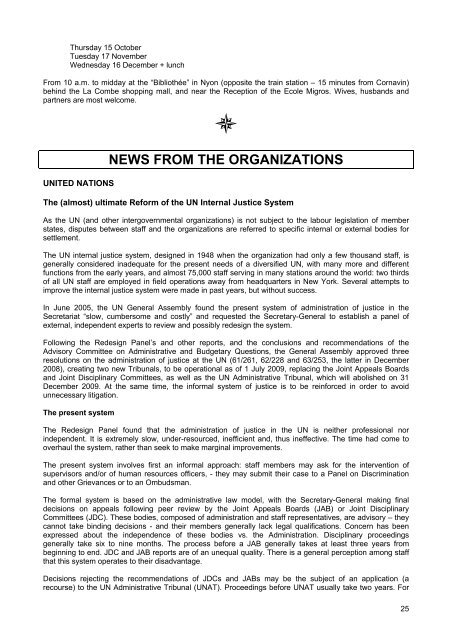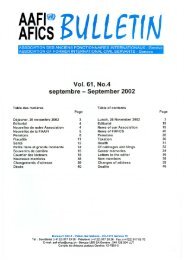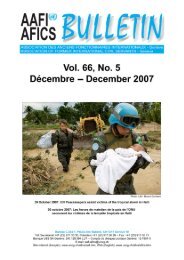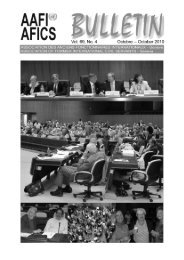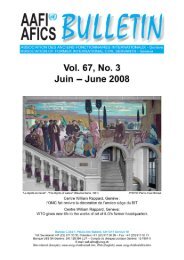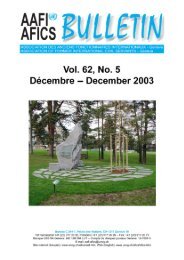VOL. 68, NO. 2 - AAFI-AFICS, Geneva - UNOG
VOL. 68, NO. 2 - AAFI-AFICS, Geneva - UNOG
VOL. 68, NO. 2 - AAFI-AFICS, Geneva - UNOG
You also want an ePaper? Increase the reach of your titles
YUMPU automatically turns print PDFs into web optimized ePapers that Google loves.
Thursday 15 October<br />
Tuesday 17 November<br />
Wednesday 16 December + lunch<br />
From 10 a.m. to midday at the “Bibliothée” in Nyon (opposite the train station – 15 minutes from Cornavin)<br />
behind the La Combe shopping mall, and near the Reception of the Ecole Migros. Wives, husbands and<br />
partners are most welcome.<br />
UNITED NATIONS<br />
NEWS FROM THE ORGANIZATIONS<br />
The (almost) ultimate Reform of the UN Internal Justice System<br />
As the UN (and other intergovernmental organizations) is not subject to the labour legislation of member<br />
states, disputes between staff and the organizations are referred to specific internal or external bodies for<br />
settlement.<br />
The UN internal justice system, designed in 1948 when the organization had only a few thousand staff, is<br />
generally considered inadequate for the present needs of a diversified UN, with many more and different<br />
functions from the early years, and almost 75,000 staff serving in many stations around the world: two thirds<br />
of all UN staff are employed in field operations away from headquarters in New York. Several attempts to<br />
improve the internal justice system were made in past years, but without success.<br />
In June 2005, the UN General Assembly found the present system of administration of justice in the<br />
Secretariat “slow, cumbersome and costly” and requested the Secretary-General to establish a panel of<br />
external, independent experts to review and possibly redesign the system.<br />
Following the Redesign Panel’s and other reports, and the conclusions and recommendations of the<br />
Advisory Committee on Administrative and Budgetary Questions, the General Assembly approved three<br />
resolutions on the administration of justice at the UN (61/261, 62/228 and 63/253, the latter in December<br />
2008), creating two new Tribunals, to be operational as of 1 July 2009, replacing the Joint Appeals Boards<br />
and Joint Disciplinary Committees, as well as the UN Administrative Tribunal, which will abolished on 31<br />
December 2009. At the same time, the informal system of justice is to be reinforced in order to avoid<br />
unnecessary litigation.<br />
The present system<br />
The Redesign Panel found that the administration of justice in the UN is neither professional nor<br />
independent. It is extremely slow, under-resourced, inefficient and, thus ineffective. The time had come to<br />
overhaul the system, rather than seek to make marginal improvements.<br />
The present system involves first an informal approach: staff members may ask for the intervention of<br />
supervisors and/or of human resources officers, - they may submit their case to a Panel on Discrimination<br />
and other Grievances or to an Ombudsman.<br />
The formal system is based on the administrative law model, with the Secretary-General making final<br />
decisions on appeals following peer review by the Joint Appeals Boards (JAB) or Joint Disciplinary<br />
Committees (JDC). These bodies, composed of administration and staff representatives, are advisory – they<br />
cannot take binding decisions - and their members generally lack legal qualifications. Concern has been<br />
expressed about the independence of these bodies vs. the Administration. Disciplinary proceedings<br />
generally take six to nine months. The process before a JAB generally takes at least three years from<br />
beginning to end. JDC and JAB reports are of an unequal quality. There is a general perception among staff<br />
that this system operates to their disadvantage.<br />
Decisions rejecting the recommendations of JDCs and JABs may be the subject of an application (a<br />
recourse) to the UN Administrative Tribunal (UNAT). Proceedings before UNAT usually take two years. For<br />
25


